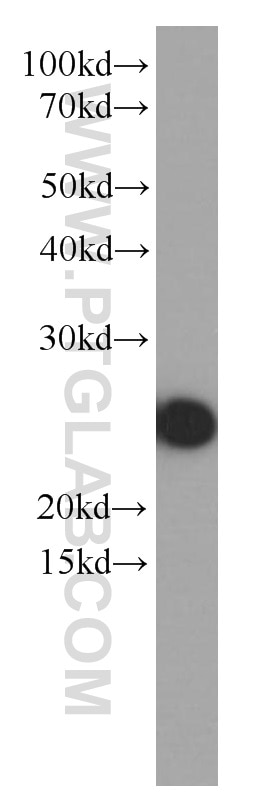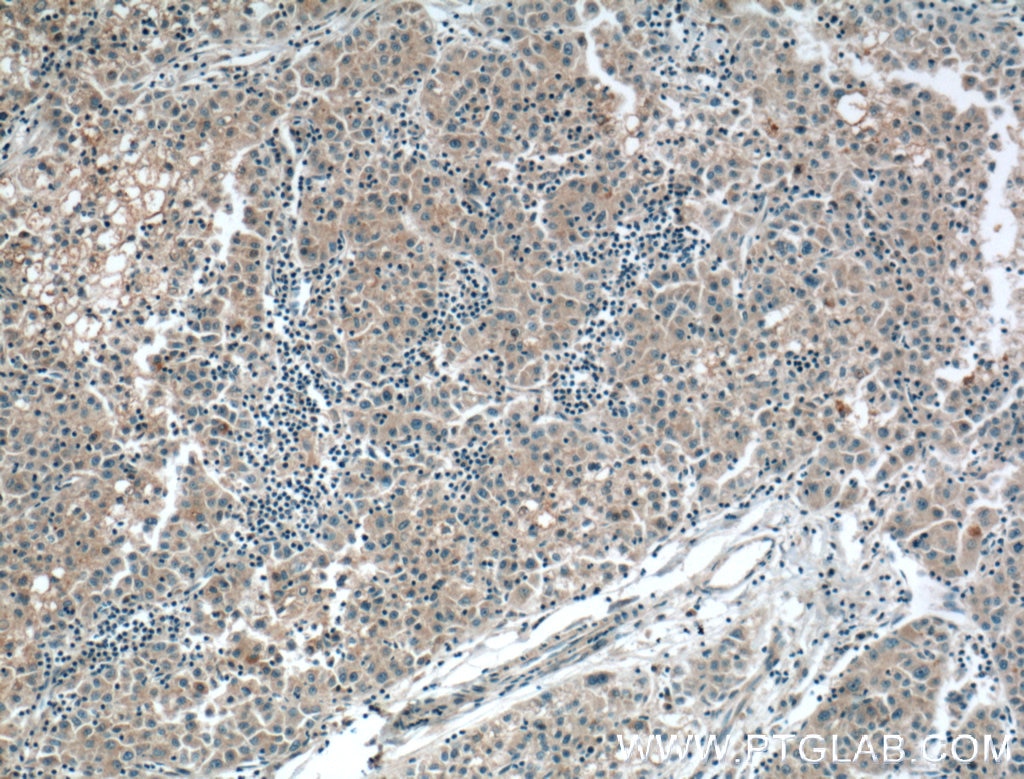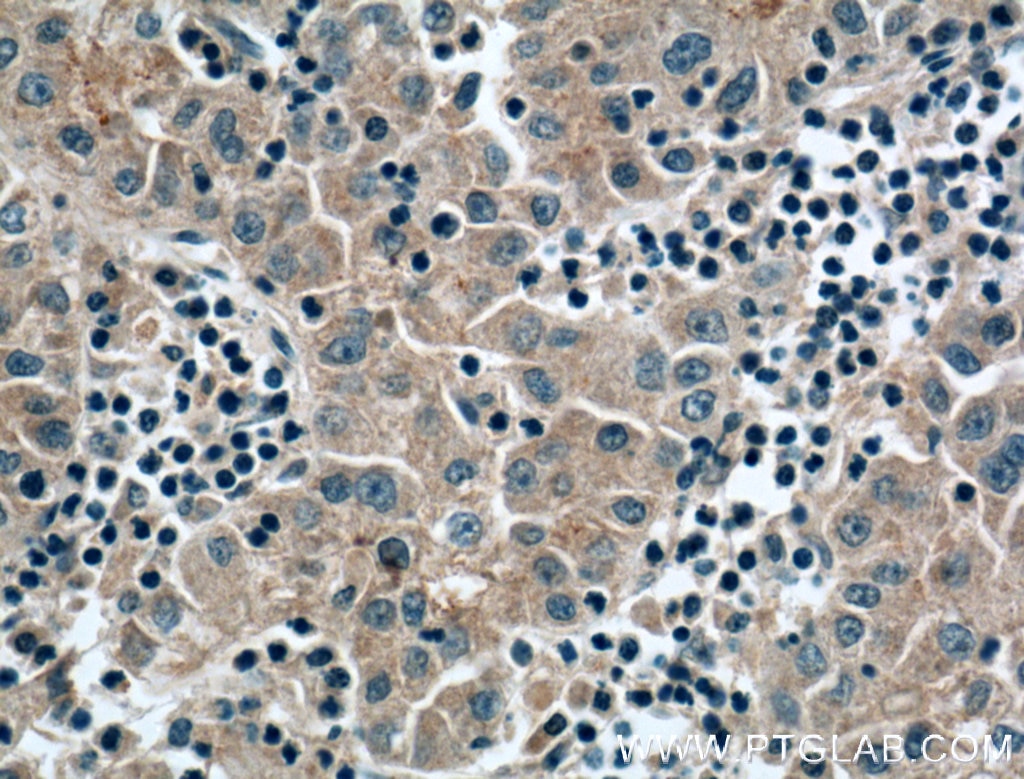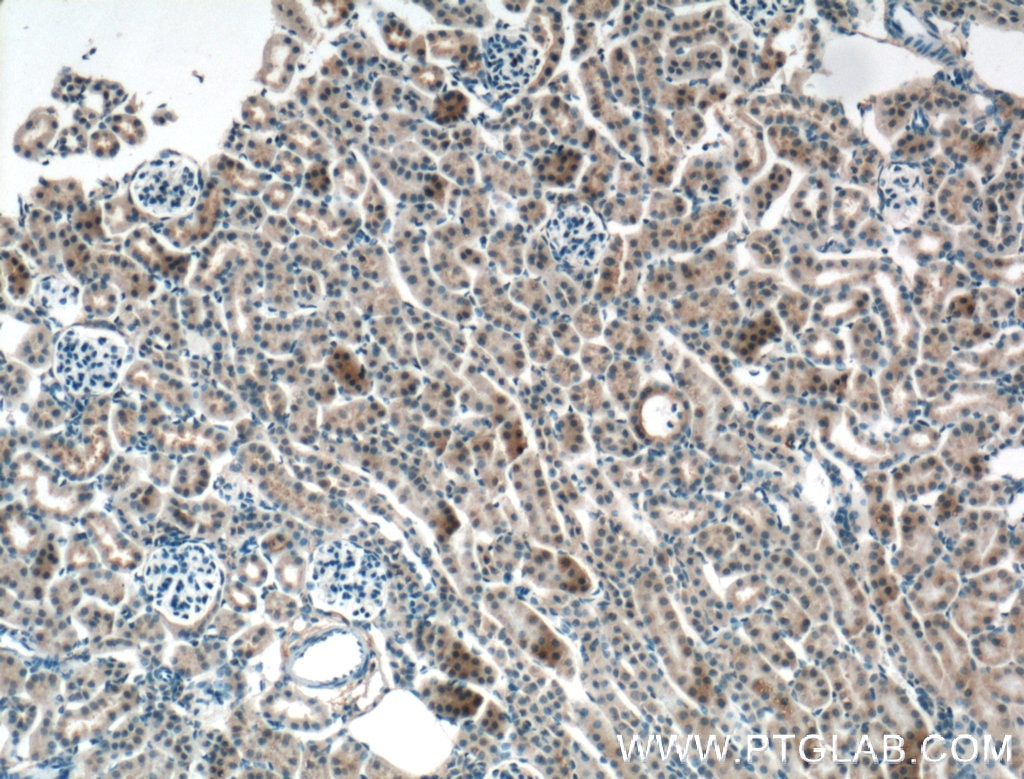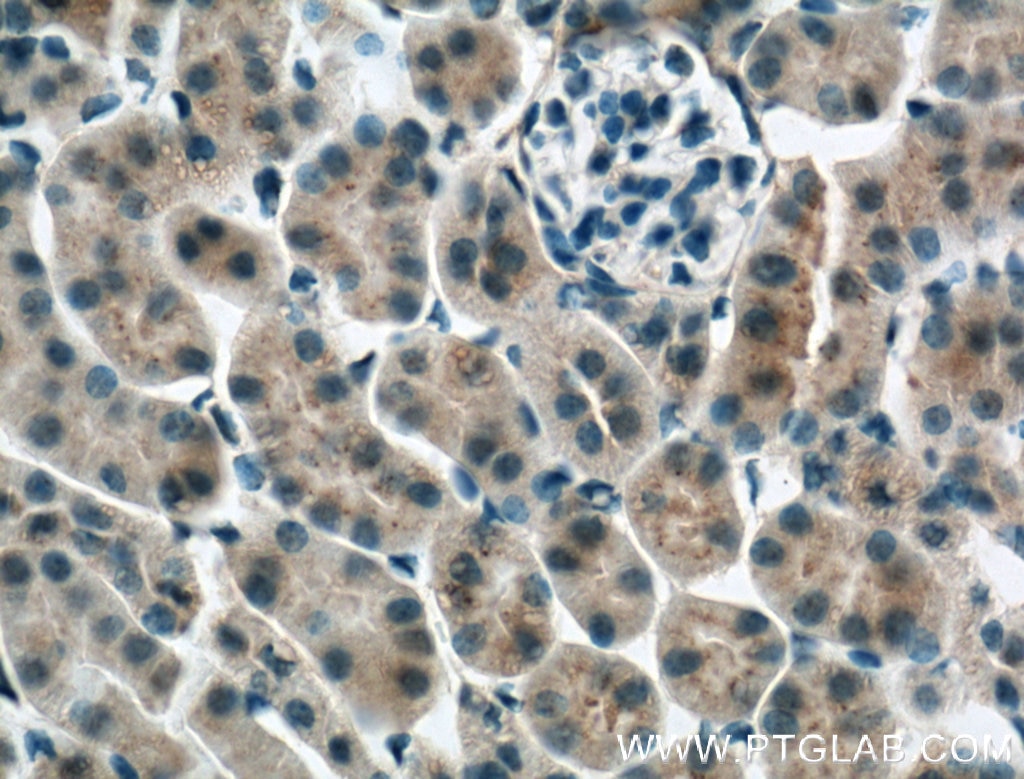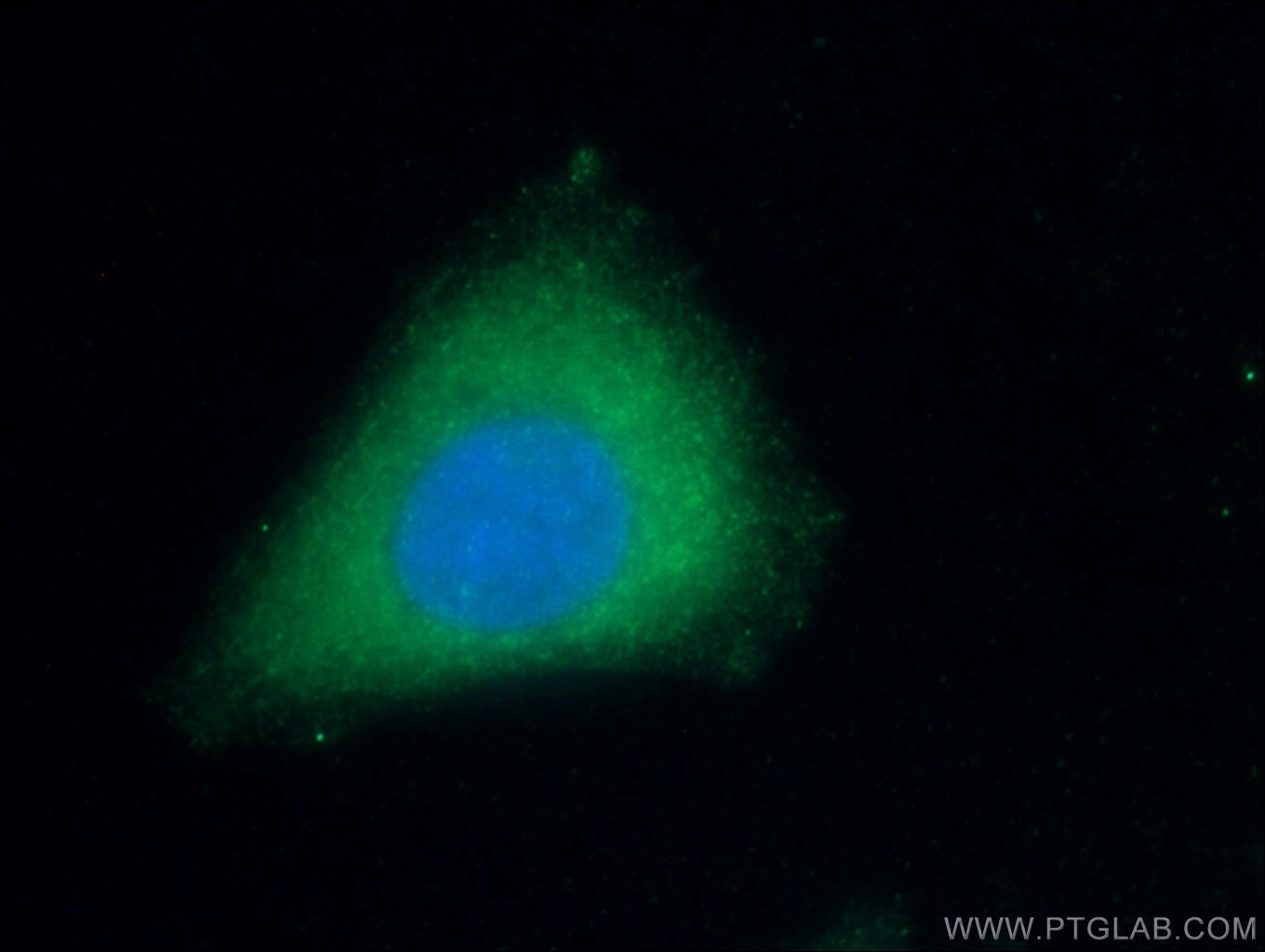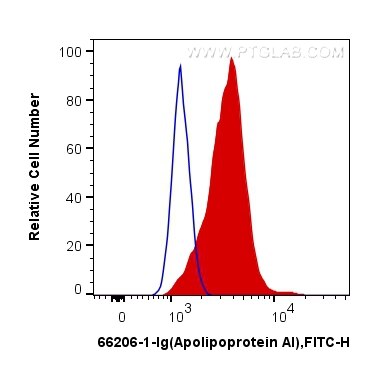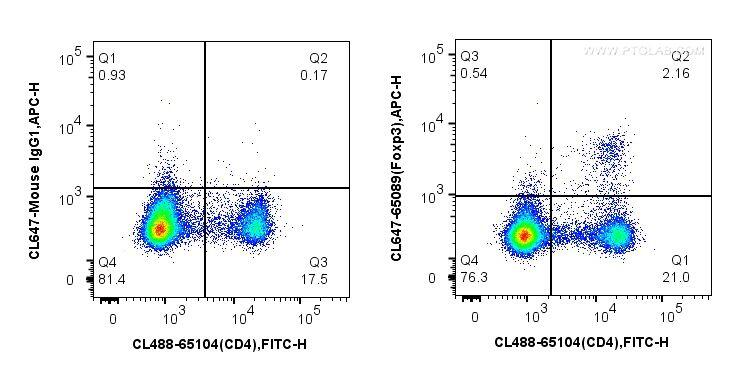Anticorps Monoclonal anti-Apolipoprotein AI
Apolipoprotein AI Monoclonal Antibody for FC, IF, IHC, WB, ELISA
Hôte / Isotype
Mouse / IgG2b
Réactivité testée
Humain, souris et plus (1)
Applications
WB, IHC, IF, FC, ELISA
Conjugaison
Non conjugué
CloneNo.
1C9G5
N° de cat : 66206-1-Ig
Synonymes
Galerie de données de validation
Applications testées
| Résultats positifs en WB | tissu plasmatique humain |
| Résultats positifs en IHC | tissu de cancer du foie humain, tissu rénal de souris il est suggéré de démasquer l'antigène avec un tampon de TE buffer pH 9.0; (*) À défaut, 'le démasquage de l'antigène peut être 'effectué avec un tampon citrate pH 6,0. |
| Résultats positifs en IF | cellules HepG2, |
| Résultats positifs en cytométrie | cellules HepG2, |
Dilution recommandée
| Application | Dilution |
|---|---|
| Western Blot (WB) | WB : 1:1000-1:4000 |
| Immunohistochimie (IHC) | IHC : 1:50-1:500 |
| Immunofluorescence (IF) | IF : 1:50-1:500 |
| Flow Cytometry (FC) | FC : 0.40 ug per 10^6 cells in a 100 µl suspension |
| It is recommended that this reagent should be titrated in each testing system to obtain optimal results. | |
| Sample-dependent, check data in validation data gallery | |
Applications publiées
| WB | See 8 publications below |
Informations sur le produit
66206-1-Ig cible Apolipoprotein AI dans les applications de WB, IHC, IF, FC, ELISA et montre une réactivité avec des échantillons Humain, souris
| Réactivité | Humain, souris |
| Réactivité citée | rat, Humain, souris |
| Hôte / Isotype | Mouse / IgG2b |
| Clonalité | Monoclonal |
| Type | Anticorps |
| Immunogène | Apolipoprotein AI Protéine recombinante Ag21920 |
| Nom complet | apolipoprotein A-I |
| Masse moléculaire calculée | 31 kDa |
| Poids moléculaire observé | 26-28 kDa |
| Numéro d’acquisition GenBank | BC005380 |
| Symbole du gène | APOA1 |
| Identification du gène (NCBI) | 335 |
| Conjugaison | Non conjugué |
| Forme | Liquide |
| Méthode de purification | Purification par protéine A |
| Tampon de stockage | PBS avec azoture de sodium à 0,02 % et glycérol à 50 % pH 7,3 |
| Conditions de stockage | Stocker à -20°C. Stable pendant un an après l'expédition. L'aliquotage n'est pas nécessaire pour le stockage à -20oC Les 20ul contiennent 0,1% de BSA. |
Informations générales
ApoA1 is a major protein component of high density lipoproteins (HDL) which is associated with reversed cholesterol transport, lipid/cholesterol binding, lecithin/cholesterol acyltransferase (LCAT) activation and specific receptors binding. It is synthesized in the liver and small intestine. Defects of ApoA1 cause low HDL level and systemic non-neuropathic amyloidosis. Serum concentration of ApoA1 is inversely related to the risk of developing atherosclerosis. This antibody was generated against the C-terminal region of human ApoA1.
Protocole
| Product Specific Protocols | |
|---|---|
| WB protocol for Apolipoprotein AI antibody 66206-1-Ig | Download protocol |
| IHC protocol for Apolipoprotein AI antibody 66206-1-Ig | Download protocol |
| IF protocol for Apolipoprotein AI antibody 66206-1-Ig | Download protocol |
| Standard Protocols | |
|---|---|
| Click here to view our Standard Protocols |
Publications
| Species | Application | Title |
|---|---|---|
Mol Cell Proteomics Differential proteomic analysis of gender-dependent hepatic tumorigenesis in Hras12V transgenic mice. | ||
Peptides Neuropeptide Y promotes hepatic apolipoprotein A1 synthesis and secretion through neuropeptide Y Y5 receptor. | ||
JCI Insight Aldehyde dehydrogenase 2 and PARP1 interaction modulates hepatic HDL biogenesis by LXRα-mediated ABCA1 expression. | ||
Front Nutr Fenofibrate enhances lipid deposition via modulating PPARγ, SREBP-1c, and gut microbiota in ob/ob mice fed a high-fat diet | ||
Int J Mol Sci Recombinant Humanized IgG1 Antibody Promotes Reverse Cholesterol Transport through FcRn-ERK1/2-PPARα Pathway in Hepatocytes |
